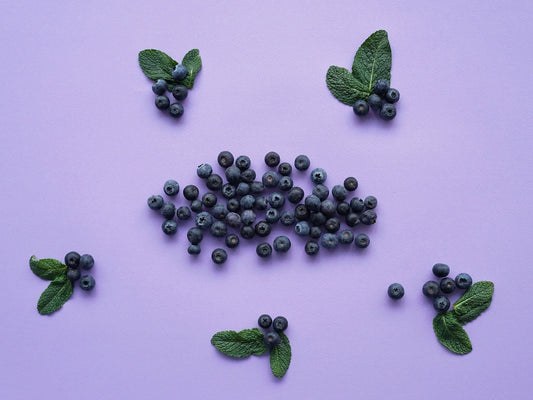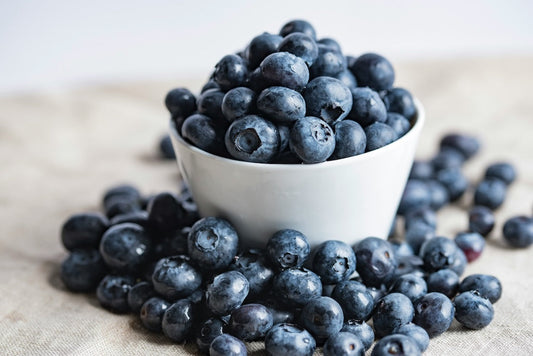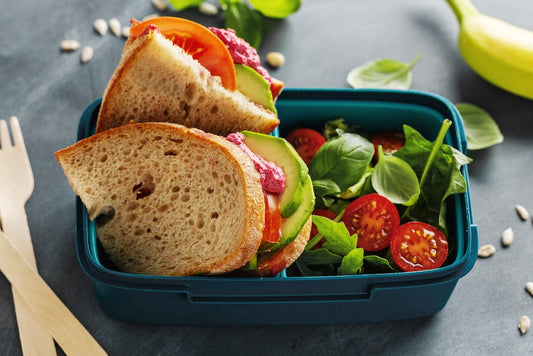Is the banana already a regular part of your diet?
If not, this post will change that. You may not remember, but even as a toddler you probably already tried this exotic yet familiar fruit. It is an incredibly healthy fruit for people of all ages, especially for children.
As a natural source of energy, bananas play a central role in a healthy diet. Each banana is a small powerhouse that provides quick energy in the form of calories and essential nutrients. The carbohydrates contained in bananas provide an immediate energy boost, while their rich spectrum of vitamins and minerals makes them an indispensable part of a balanced diet.
Whether you eat them before a workout, as a pick-me-up in the morning or as a healthy snack, bananas prove that healthy eating can be both nutritious and enjoyable.
Everything you need to know about bananas!
A brief overview
If you would like to go into more depth on the individual topics, you will find everything you want to know by clicking on the links provided. Enjoy browsing!
The influence of bananas on your blood sugar level
The yellow fruit can help keep your blood sugar level stable with their sugar content and moderate glycemic index. Have you ever enjoyed a banana as a quick snack before going for a run and felt really good doing it? That's no coincidence! The natural fruit sugar in bananas, combined with a moderate glycemic index, ensures a steady supply of energy without causing your blood sugar level to skyrocket.
This makes bananas an ideal snack, even for diabetics, when enjoyed in moderation.
Banana as an energy source – its nutritional values
What about the nutritional value of bananas and how many calories do bananas have? On average, bananas contain about 90 calories per 100 grams, which makes them a high-energy snack without being a calorie bomb. Most of their energy comes from carbohydrates; a medium-sized banana provides about 23 grams of these, mainly in the form of sugar and resistant starch, which is predominant in unripe bananas.
Bananas contain very little fat, usually less than 0.3 grams per 100 grams of banana. They also provide about 1 gram of protein per 100 grams. This composition makes bananas an ideal source of quick energy, especially before or after exercise.
Bananas and their nutritional values
Vitamins and minerals in bananas
Whether you have them as part of your morning smoothie or eat them on their own, bananas give your immune system a boost with a powerful punch of vitamins C and B6. The antioxidants in bananas fight free radicals and protect your cells. One banana a day gives you a good portion of your daily requirement of these essential vitamins.
Bananas as part of a balanced and healthy diet
Bananas are the unsung heroes of a balanced diet. Their pectin, a soluble fiber, aids digestion and can even help you fight high cholesterol. Tossed in with a handful of nuts, bananas are the perfect heart-healthy snack.
The role of bananas in muscle building and fitness
Are you a fitness enthusiast? A banana before your workout can work wonders! It not only provides you with the energy your muscles need, but also potassium, which helps prevent cramps. And after your workout? Bananas help you recover quickly.
Why bananas are good for your psyche
Bananas can also support your mental well-being. If you're feeling down, reach for a banana. The tryptophan (an amino acid) it contains helps your body produce serotonin. So a banana can actually lift your mood and reduce stress. Tryptophan is the precursor to the neurotransmitter serotonin. Serotonin levels play a major role in depressive moods.
Bananas in the kitchen
Whether it's banana bread in the morning or a cool banana smoothie after a workout, bananas are true all-rounders in the kitchen. They add a natural sweetness to any dish and turn even the simplest fruit salad into a culinary delight. Depending on how ripe they are, you can use bananas in different ways.
And for an extra portion of energy? Enjoy your banana in combination with a nutritious porridge. At Verival, for example, you will find everything you need to know about healthy breakfast.
By the way, a little tip on the side: banana skins make good flower fertilizer. Simply cut the skins into small pieces and mix them into the soil. There the skins will quickly rot and release magnesium, potassium, sulphur, phosphate, sodium, silicic acid and lime.
Porridge with banana – discover it now!
Conclusion
If you don't have a permanent place reserved for bananas in your diet yet, then it's high time you did! These yellow bundles of energy are not only a quick source of energy in between meals, but also real wonders of nature.
So, the next time you're feeling a bit low and are looking for a healthy snack, reach for a banana. Your body will thank you for it! Because, hopefully, you now have no doubt that bananas are healthy!
Frequently asked questions
Are ripe or green bananas healthier?
Ripe bananas contain more fructose and are therefore sweeter, which provides a quick energy boost. Green bananas, on the other hand, have a higher content of resistant starch, which has positive effects on blood sugar levels and digestion. Both ripe and unripe fruits have their advantages, depending on your individual health goals.
How do bananas affect blood sugar levels?
Of course, bananas contain fructose, which increases your blood sugar level. The riper the banana, the more sugar it contains. However, the pectin in bananas helps regulate blood sugar levels, especially when you eat bananas with other nutrient-dense foods like oatmeal.
Can eating bananas help you lose weight?
Yes, bananas have a long-lasting satiating effect due to their high fiber and resistant starch content, especially in green bananas, and can thus support your weight management. They also provide you with important nutrients.
Are bananas a suitable food for athletes?
Definitely, bananas are particularly suitable for you if you do a lot of sport because of their carbohydrate content, which provides quick energy, and their important minerals such as potassium, which helps to prevent muscle cramps. The energy provided by bananas can be quickly absorbed by your body.
How many bananas should I eat a day?
The recommended amount can vary, but one to two bananas a day can already make a positive contribution to a balanced diet. Always pay attention to your body's reactions. For some, one banana may be the right amount, while others feel good with 3 bananas spread throughout the day.
Why are bananas often referred to as superfoods?
Bananas deserve the title “superfood” because of their rich array of nutrients, including vitamin C, vitamin B6, folate and antioxidants, making them a powerful source of health and well-being.
Is it healthy to eat a banana every day?
Yes, it is healthy to eat a banana every day as long as it is part of a balanced diet. Bananas provide you with essential vitamins such as vitamin C and B6, minerals such as potassium, and are also a good source of fiber and antioxidants. However, you should take into account individual tolerance and practice an overall balanced diet to avoid overconsumption.
How healthy are bananas for the body?
Bananas are very healthy for your body. They support your heart health with their high potassium content, promote your digestion thanks to their fiber, regulate your blood sugar level with their moderate glycemic index, and strengthen your immune system with vitamins C and B6. They can also improve your well-being and mood thanks to tryptophan (an amino acid that promotes the production of the happiness hormone serotonin).
How many bananas a day are healthy?
In general, one to two bananas a day is healthy for most people. This amount supports a balanced diet without an excessive intake of sugar or calories. However, the exact amount can vary depending on your individual energy needs, activity level and health condition.
When should I eat bananas?
You can eat bananas at any time of the day. They offer different benefits depending on when you eat them. In the morning, they provide a quick energy boost and are therefore a popular part of a healthy breakfast. As a post-workout snack, they can help provide a quick energy boost and support muscle recovery. Green bananas eaten in the evening can help your nighttime digestion due to their resistant starch content. However, you should not eat bananas immediately before going to bed to avoid indigestion.
























